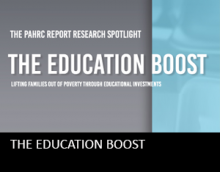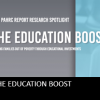0
Report
Community:
Jun 6, 2019
Trends in Housing Assistance and Who it Serves
Authored by: PAHRC
Topics: Community development, Disabilities, Education, Funding, Health, Homelessness, Housing, Legislation & Policy, Low-income, Partnerships, Research, Seniors, Workforce development, Youth
 Shared by Keely Stater
Shared by Keely Stater
Keely Stater posted a
on Sep 10, 2019
Trends in Housing Assistance and Who it Serves
0
Report
Community:
May 1, 2019
Child poverty is an urgent and preventable crisis. Solutions to child poverty already exist if we just expand and invest in them. Benefits like nutrition assistance, housing vouchers and tax credits helped lift nearly 7 million children out of poverty in 2017, but millions of children were left behind due to inadequate funding, eligibility restrictions and low wages. We can and must fix these problems to help more children escape poverty now.
Authored by: Children's Defense Fund
Topics: Child welfare, Dual-generation, Early childhood, Food insecurity, Funding, Housing, Legislation & Policy, Low-income, Research, Workforce development
 Shared by Housing Is
Shared by Housing Is
Housing Is posted a
on May 28, 2019
Child poverty is an urgent and preventable crisis. Solutions to child poverty already exist if we just expand and invest in them.
0
Research
Community:
Jan 25, 2019
The employment social enterprise (ESE) model can provide an opportunity to create a financially viable business that helps individuals with employment barriers become integrated into the labor force. This research studied eight ESEs. Findings suggest that by applying private‐sector business principles to a workforce development programs, social enterprises can provide participants with meaningful and valuable work experience, while offsetting program costs. Analysis identified four promising practices that social entrepreneurs should adopt when setting up a new enterprise. Enterprises should (a) provide soft‐skill training and social services to participants; (b) operate at a size that allows for economies of scale in production and the provision of support services; (c) have few occupational skill requirements; and (d) hire supervisors with both industry knowledge and the capacity to support individuals with employment barriers.
Authored by: Mathematica Policy Research
Topics: Asset building, Low-income, Research, Workforce development
 Shared by Housing Is
Shared by Housing Is
Housing Is posted a
on Mar 18, 2019
Mathematica Policy Research
The employment social enterprise (ESE) model can provide an opportunity to create a financially viable business that helps individuals with employment barriers become integrated into the labor force. This research studied eight ESEs.
0
Podcast
Community:
One out of every 10 young people between the ages of 16 and 24 is neither working nor in school. These “disconnected” young people face an uphill battle finding work and are at risk of economic hardship well into adulthood. Although there are many programs that aim to reconnect young people to education and employment, findings from evaluations of these programs have been mixed. The evidence base has grown substantially in the past several months, though, as studies of three programs — YouthBuild, Year Up, and New York City’s Young Adult Internship Program (YAIP) — have released new findings. MDRC’s Dan Bloom and Cynthia Miller recently wrote a brief that discusses findings from the new studies and their implications for youth programs.
Authored by: MDRC
Topics: Asset building, Low-income, Mobility, Research, Workforce development, Youth
 Shared by Housing Is
Shared by Housing Is
Housing Is posted a
on Mar 8, 2019
One out of every 10 young people between the ages of 16 and 24 is neither working nor in school. These “disconnected” young people face an uphill battle finding work and are at risk of economic hardship well into adulthood.
0
Research
Community:
Feb 20, 2019
As the US Department of Housing and Urban Development (HUD) prioritizes programs to help households receiving rental assistance achieve economic self-sufficiency, researchers, policymakers, and advocates debate the utility of work requirements as an effective pathway toward economic self-sufficiency and the risks of offering rental assistance on a conditional basis. This study contributes additional evidence suggesting that work requirements, when implemented gradually and in context with hardship exemptions and local supports, can boost annual household income, earnings, and the adult-employment ratio* for low-income households with no work history. But work requirements have little effect on those with prior earnings.
Authored by: Han Bum Lee and Paul E. McNamara for Housing Policy Debate (How Housing Matters, Urban Institute)
Topics: Asset building, Housing, Legislation & Policy, Low-income, Research, Workforce development
 Shared by Housing Is
Shared by Housing Is
Housing Is posted a
on Feb 21, 2019
Han Bum Lee and Paul E. McNamara for Housing Policy Debate (How Housing Matters, Urban Institute)
As the US Department of Housing and Urban Development (HUD) prioritizes programs to help households receiving rental assistance achieve economic self-sufficiency, researchers, policymakers, and advocates debate the utility of work requirements as an effective pathway toward economic self-sufficiency
0
Report
Community:
Jan 16, 2019
This report identifies services that help low-income individuals and households achieve upward economic mobility and explores how affordable housing providers offer them. We begin by presenting key economic mobility concepts and definitions. We then discuss the research evidence on interventions across sectors and disciplines that help individuals and households to achieve upward economic mobility. In the third section of this report, we present our findings from interviews with leading organizations and initiatives in the field. Finally, we discuss challenges for affordable housing providers seeking to help their residents achieve economic mobility and opportunities for future research.
Authored by: Eric Burnstein, Megan Gallagher, and Wilton Oliver for the Urban Institute
Topics: Asset building, Housing, Legislation & Policy, Low-income, Research, Workforce development
 Shared by Housing Is
Shared by Housing Is
Housing Is posted a
on Feb 14, 2019
Eric Burnstein, Megan Gallagher, and Wilton Oliver for the Urban Institute
This report identifies services that help low-income individuals and households achieve upward economic mobility and explores how affordable housing providers offer them. We begin by presenting key economic mobility concepts and definitions.
0
Publication
Community:
Dec 17, 2018
In response to the heightened interest in the relationship between work and the health of individuals and communities, CMCS has clarified that Medicaid funds cannot be used to pay beneficiaries’ wages, but can pay for employment counseling as an optional benefit—to help people get jobs. Years of experience with work requirements for the Supplemental Nutrition Assistance Program, Aid to Families with Dependent Children, and populations with disabilities have developed the evidence for what is needed to help different populations find and keep jobs.
Authored by: Christopher F. Koller for Millbank Memorial Fund
Topics: Affordable Care Act, Disabilities, Health, Legislation & Policy, Low-income, Medicaid / Medicare, Research, Stability, Workforce development
 Shared by Mica O'Brien
Shared by Mica O'Brien
Mica O'Brien posted a
on Dec 17, 2018
Christopher F. Koller for Millbank Memorial Fund
In response to the heightened interest in the relationship between work and the health of individuals and communities, CMCS has clarified that Medicaid funds cannot be used to pay beneficiaries’ wages, but can pay for employment counseling as an optional benefit—to help people get jobs.
0
Publication
Community:
Dec 17, 2018
Stricter work requirement policies for the Supplemental Nutrition Assistance Program (SNAP) at the federal level were left out of the recently passed farm bill, but state policymakers are still considering whether to expand or establish their own work requirements for SNAP and Medicaid, with the goal of incentivizing employment. There’s no question that good jobs help spur upward mobility. But if we are serious about helping people work, we have to get serious about helping people improve their skills.
Authored by: Gina Adams and Shayne Spaulding for The Urban Institute
Topics: Child welfare, Cost effectiveness, Dual-generation, Early childhood, Food insecurity, Legislation & Policy, Low-income, Research, Stability, Workforce development
 Shared by Mica O'Brien
Shared by Mica O'Brien
Mica O'Brien posted a
on Dec 17, 2018
Gina Adams and Shayne Spaulding for The Urban Institute
Stricter work requirement policies for the Supplemental Nutrition Assistance Program (SNAP) at the federal level were left out of the recently passed farm bill, but state policymakers are still considering whether to expand or establish their own work requirements for SNAP and Medicaid, with the goa
0
Case study
Community:
Dec 11, 2018
As the Trump Administration continues to encourage states to take Medicaid coverage away from people who don’t meet a work requirement, a new report describes Montana’s promising alternative: a workforce promotion program that targets state resources toward reducing barriers to work.
Authored by: Hannah Katch for Center on Budget and Policy Priorities
Topics: Affordable Care Act, Asset building, Health, Legislation & Policy, Low-income, Medicaid / Medicare, Partnerships, Research, Workforce development
 Shared by Housing Is
Shared by Housing Is
Housing Is posted a
on Dec 11, 2018
Hannah Katch for Center on Budget and Policy Priorities
As the Trump Administration continues to encourage states to take Medicaid coverage away from people who don’t meet a work requirement, a new report describes Montana’s promising alternative: a workforce promotion program that targets state resources toward reducing barriers to work.
0
Podcast
Community:
How should policymakers address the long-standing youth unemployment problem in Puerto Rico, which only worsened in the wake of Hurricanes Irma and Maria? After natural disasters, the government tends to focus its recovery efforts on infrastructure repairs and mental health services. But employment and economic security are equally important. With support from the W. T. Grant Foundation, MDRC partnered with Instituto del Desarrollo de la Juventud, or the Youth Development Institute, to develop recommendations that can create pathways into the workforce for young people and that are supported by evidence-based and promising practices relevant to the current situation in Puerto Rico.
Join Katie Beal as she talks to John Martinez, Director of Program Development at MDRC, about the recommendations we made to facilitate and support training and employment opportunities for young people in Puerto Rico, and the challenges of implementing those recommendations.
Authored by: MDRC
Topics: Low-income, Research, Workforce development, Youth
 Shared by Mica O'Brien
Shared by Mica O'Brien
Mica O'Brien posted a
on Nov 19, 2018
How should policymakers address the long-standing youth unemployment problem in Puerto Rico, which only worsened in the wake of Hurricanes Irma and Maria? After natural disasters, the government tends to focus its recovery efforts on infrastructure repairs and mental health services.
0
Report
Community:
May 1, 2018
The Enhanced Transitional Jobs Demonstration (ETJD), funded by the Employment and Training Administration of the U.S. Department of Labor, tested seven transitional jobs programs that targeted people recently released from prison or low-income parents who had fallen behind in child support payments.
Authored by: MDRC, OPRE, and Employment and Training Demonstration
Topics: Asset building, Cost effectiveness, Criminal justice, Legislation & Policy, Low-income, Research, Stability, Workforce development, Youth
 Shared by Mica O'Brien
Shared by Mica O'Brien
Mica O'Brien posted a
on Nov 19, 2018
MDRC, OPRE, and Employment and Training Demonstration
The Enhanced Transitional Jobs Demonstration (ETJD), funded by the Employment and Training Administration of the U.S.
0
Research
Community:
Oct 25, 2018
In contrast to the portrayal of homelessness as affecting people with behavioral health problems or low employment capacity, cycles of homelessness could reflect job shifts that bring a household in or out of poverty. To assess the connections between employment and homelessness, researchers focused on three topics: (1) employment and earnings before, during, and after adults used a homeless shelter; (2) changes in employment and earnings in connection to shelter entry and exit; and (3) employment and earnings differences between adults who are homeless as part of a family versus as individuals.
Authored by: Stephen Metraux, Jamison Fargo, Nicholas Eng, and Dennis Culhane for Cityscape
Topics: Asset building, Homelessness, Housing, Low-income, Research, Stability, Workforce development
 Shared by Mica O'Brien
Shared by Mica O'Brien
Mica O'Brien posted a
on Oct 25, 2018
Stephen Metraux, Jamison Fargo, Nicholas Eng, and Dennis Culhane for Cityscape
In contrast to the portrayal of homelessness as affecting people with behavioral health problems or low employment capacity, cycles of homelessness could reflect job shifts that bring a household in or out of poverty.
0
Report
Community:
Oct 24, 2018
CLPHA’s Housing Is Initiative is engaged in a number of cross-sector activities focused on developing partnerships, facilitating a community of practice, resource development, promoting best practices, online collaboration, policy and advocacy, and training and education. Read about recent activities in this Fall Update.
Authored by:
Topics: Child welfare, CLPHA, Community development, Cost effectiveness, Data sharing, Early childhood, Education, Family engagement, Funding, Health, Homelessness, Housing, Low-income, Medicaid / Medicare, Mental health, Partnerships, Place-based, Post-secondary, Research, Stability, Substance abuse, Workforce development, Youth
 Shared by Mica O'Brien
Shared by Mica O'Brien
Mica O'Brien posted a
on Oct 24, 2018
CLPHA’s Housing Is Initiative is engaged in a number of cross-sector activities focused on developing partnerships, facilitating a community of practice, resource development, promoting best practices, online collaboration, policy and advocacy, and training and education.
0
Policy Brief
Community:
Oct 9, 2018
This brief highlights evidence on income support policies, and associated work requirements, for families with young children and proposes a policy-focused research agenda designed to address knowledge gaps in two areas: (1) understanding disparities in participation in income supports and (2) assessing innovative strategies to reduce disparities in income supports.
Authored by: Mathematica
Topics: Legislation & Policy, Low-income, Research, Workforce development
 Shared by Mica O'Brien
Shared by Mica O'Brien
Mica O'Brien posted a
on Oct 22, 2018
This brief highlights evidence on income support policies, and associated work requirements, for families with young children and proposes a policy-focused research agenda designed to address knowledge gaps in two areas: (1) understanding disparities in participation in income supports and (2) asses
0
Case study
Community:
Jun 25, 2018
The King County Housing Authority (KCHA), in partnership with the Highline School District and the nonprofit social service organization Neighborhood House, launched the Student and Family Stability Initiative (SFSI) pilot program in 2013 to provide housing and employment supports to homeless and unstably housed families with children enrolled in Highline elementary schools. In 2016, KCHA contracted with the Urban Institute (Urban) to conduct a process and outcome evaluation of the program’s first three pilot years. This evaluation documents how SFSI works, who it serves, and how well it helps participants achieve housing stability. This report synthesizes findings from data collection conducted over approximately 10 months that included document review, interviews with SFSI stakeholders, and analysis of program and other relevant KCHA administrative data.
Authored by: Martha M. Galvez, Amanda Gold, and Sara McTarnaghan
Topics: Attendance, Dual-generation, Education, Family engagement, Housing, Low-income, Pacific Northwest, Partnerships, Place-based, Research, Stability, Workforce development, Youth
 Shared by Mica O'Brien
Shared by Mica O'Brien
Mica O'Brien posted a
on Sep 18, 2018
Martha M. Galvez, Amanda Gold, and Sara McTarnaghan
The King County Housing Authority (KCHA), in partnership with the Highline School District and the nonprofit social service organization Neighborhood House, launched the Student and Family Stability Initiative (SFSI) pilot program in 2013 to provide housing and employment supports to homeless and un
1
Report
Community:
May 1, 2018
Our initial report—which followed participants around the country over three years—found, among other things, that Year Up increased participants’ average quarterly earnings by more than 50 percent. These are the largest gains in earnings measured to date in random assignment studies of workforce training programs for youth and adults.
Authored by: David Fein and Jill Hamadyk for Abt Associates
Topics: Asset building, Education, Low-income, Mobility, Post-secondary, Research, Workforce development, Youth
 Shared by Housing Is
Shared by Housing Is
Housing Is posted a
on Aug 16, 2018
David Fein and Jill Hamadyk for Abt Associates
Our initial report—which followed participants around the country over three years—found, among other things, that Year Up increased participants’ average quarterly earnings by more than 50 percent.
0
Research
Community:
Aug 1, 2018
Work requirements in public housing are highly controversial, and
little is known about their impacts. We examined how implementation of a work requirement paired with supportive services by Charlotte Housing Authority has impacted residents’ overall well-being. Although the policy might improve well-being
by increasing household income, it might also engender stress through greater housing precarity.
Authored by:
Topics: Depression, Disabilities, Education, Food insecurity, Health, Housing, Low-income, Medicaid / Medicare, Mental health, Metrics, MTW, Partnerships, Racial inequalities, Research, South, Workforce development
 Shared by Housing Is
Shared by Housing Is
Housing Is posted a
on Aug 1, 2018
Work requirements in public housing are highly controversial, and
little is known about their impacts. We examined how implementation of a work requirement paired with supportive services by Charlotte Housing Authority has impacted residents’ overall well-being.
0
Interactive
Community:
Dec 21, 2017
Authored by: Domenick Lasorsa for the National League of Cities
Topics: Community development, Cost effectiveness, Housing, Legislation & Policy, Low-income, Metrics, Partnerships, Place-based, Research, Stability, Workforce development
 Shared by Housing Is
Shared by Housing Is
Housing Is posted a
on Jul 5, 2018
Domenick Lasorsa for the National League of Cities
0
News Article
Community:
Feb 15, 2018
Authored by: Jon Marcus and Matt Krupnick for The Hechinger Report (originally featured in The Atlantic)
Topics: Community development, Education, Family engagement, Low-income, Midwest, Post-secondary, Research, Workforce development, Youth
 Shared by Housing Is
Shared by Housing Is
Housing Is posted a
on Jul 5, 2018
Jon Marcus and Matt Krupnick for The Hechinger Report (originally featured in The Atlantic)
0
Report
Community:
Jun 29, 2017
Violent-crime arrests drop by 33 percent for program participants.
Authored by: UChicago News
Topics: Child welfare, Criminal justice, Education, Low-income, Midwest, Mobility, Out-of-school time, Post-secondary, Racial inequalities, Research, Safety, Substance abuse, Workforce development, Youth
 Shared by Housing Is
Shared by Housing Is
Housing Is posted a
on Jul 5, 2018
Violent-crime arrests drop by 33 percent for program participants.
0
Report
Community:
Nov 1, 2017
Why do some neighborhoods appear able to launch effective local improvement initiatives, while others are more hampered by fragmentation and mistrust? Why can some communities mobilize diverse constituencies to influence public policy, while others cannot? Answers to these questions may be found in the specific patterns of collaboration that form among community organizations, and between these groups, schools, public agencies, and elected officials, according to MDRC, a preeminent social-policy research organization.
Authored by: MDRC
Topics: Asset building, Child welfare, Community development, Data sharing, Dual-generation, Education, Family engagement, Funding, Health, Housing, Legislation & Policy, Low-income, Metrics, Midwest, Mobility, Out-of-school time, Partnerships, Place-based, Preventative care, Research, Safety, Stability, Workforce development, Youth
 Shared by Mica O'Brien
Shared by Mica O'Brien
Mica O'Brien posted a
on Jun 29, 2018
Why do some neighborhoods appear able to launch effective local improvement initiatives, while others are more hampered by fragmentation and mistrust? Why can some communities mobilize diverse constituencies to influence public policy, while others cannot?
1
Video
Community:
May 23, 2018
The Council of Large Public Housing Authorities (CLPHA) hosted The Housing Is Summit in Washington, D.C., on May 3-4, 2018 with 300 partners across the housing, education, and healthcare sectors. Access video recordings of the Summit's keynote speakers (HUD Secretary Ben Carson, John Bridgeland, Matthew Morton), plenary panels (on topics that cut across sectors like anchor institutions, data collaboration, stability, and foundation investments), and select breakout sessions focused on the intersections of housing, education, and health.
Authored by: Council of Large Public Housing Authorities
Topics: Affordable Care Act, Attendance, Child welfare, CLPHA, Community development, Data sharing, Dual-eligibles, Dual-generation, Early childhood, Education, Funding, Grade-level proficiency, Health, Healthy homes, Homelessness, Housing, Legislation & Policy, Low-income, Medicaid / Medicare, Mental health, Metrics, MTW, Out-of-school time, Partnerships, Place-based, Preventative care, Racial inequalities, Research, School-readiness, Seniors, Stability, Substance abuse, Supportive housing, Sustainability, TA, Workforce development, Youth
 Shared by Steve Lucas
Shared by Steve Lucas
Steve Lucas posted a
on May 23, 2018
The Council of Large Public Housing Authorities (CLPHA) hosted The Housing Is Summit in Washington, D.C., on May 3-4, 2018 with 200 partners across the housing, education, and healthcare sectors. The Summit highlighted the ways that we can transform systems to better serve low-income people with two days of plenary speakers/panels, breakout sessions, and caucus discussions geared toward intersectional thinking and ways to take action.
Council of Large Public Housing Authorities
The Council of Large Public Housing Authorities (CLPHA) hosted The Housing Is Summit in Washington, D.C., on May 3-4, 2018 with 300 partners across the housing, education, and healthcare sectors.
0
Research
Community:
Mar 1, 2017
Authored by: The Public and Affordable Housing Research Corporation (PAHRC)
Topics: Education, Housing, Low-income, Post-secondary, Research, Workforce development
 Shared by Keely Stater
Shared by Keely Stater
Keely Stater posted a
on Jun 6, 2017
The Public and Affordable Housing Research Corporation (PAHRC)


 Shared by Keely Stater
on Sep 10, 2019
Shared by Keely Stater
on Sep 10, 2019

 Shared by Housing Is
on May 28, 2019
Shared by Housing Is
on May 28, 2019
 Shared by Housing Is
on Mar 18, 2019
Shared by Housing Is
on Mar 18, 2019
 Shared by Housing Is
on Mar 8, 2019
Shared by Housing Is
on Mar 8, 2019
 Shared by Housing Is
on Feb 21, 2019
Shared by Housing Is
on Feb 21, 2019
 Shared by Housing Is
on Feb 14, 2019
Shared by Housing Is
on Feb 14, 2019
 Shared by Housing Is
on Dec 11, 2018
Shared by Housing Is
on Dec 11, 2018

 Shared by Housing Is
on Aug 16, 2018
Shared by Housing Is
on Aug 16, 2018

 Shared by Housing Is
on Aug 1, 2018
Shared by Housing Is
on Aug 1, 2018
 Shared by Housing Is
on Jul 5, 2018
Shared by Housing Is
on Jul 5, 2018
 Shared by Housing Is
on Jul 5, 2018
Shared by Housing Is
on Jul 5, 2018

 Shared by Housing Is
on Jul 5, 2018
Shared by Housing Is
on Jul 5, 2018



 Shared by Steve Lucas
on May 23, 2018
Shared by Steve Lucas
on May 23, 2018

 Shared by Keely Stater
on Jun 6, 2017
Shared by Keely Stater
on Jun 6, 2017
